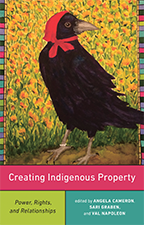
Edited by Angela Cameron, Sari Graben, and Val Napoleon
University of Toronto Press, 2020; 384 pp;
ISBN: 978-1-4875-2382-4.
By Len Findlay
Pierre-Joseph Proudhon’s blunt declaration, “Property is theft!” (La proprieté c’est le vol!) was rightly directed at rentier and other parasitic practices forming “the sum of [property’s] abuses.” But even a socialist and mutualist like Proudhon, writing in France in 1840, showed little awareness that domestic thefts of the fruits of others’ labours were dwarfed by the thievery of white progressives and reactionaries alike in Europe’s massive and immiserated colonies, nor of the fact that Eurocentric notions of labour, both capitalist and socialist, were limited and damaging lenses through which to understand Indigenous knowledge and relationships to lands stolen in a brazen frenzy of paternalism and predation.
Educating imperial powers and their settler colonies of the damage their ignorance and avarice have wrought, and the realizations and remedies now available, is one of the great intellectual accomplishments of our time. And it has been achieved predominantly through the diplomacy, litigation, and resolve of Indigenous elders, scholars, artists, and activists many of whom refined the arts of resistance in their interactions with the Canadian state, spectacularly mediocre provincial governments, and the residual and too often resurgent racism of settler Canadians. And so the hard work of educating the colonizers continues, at every level of the judiciary, across educational institutions, in the mainstream media, and in social media where, regularly, racist resentment vents in terms less learned than Gobineau’s and less measured than Macdonald’s, but no less menacing in their immediate impacts and longer term implications.
The book under review here captures both the grim and the heartening aspects of the above two paragraphs, but we still have ways to go for Canada to decolonize itself. This dense and challenging collection of essays by some of the most accomplished scholars in the field of comparative Indigenous, common, civil, and international law offers sustained assistance without guarantees of either agreement or progress. It appeared in a year which began with a series of confrontations and desperate meetings across Canada stimulated by centuries of frustration and the particular actions of the RCMP against the We’tsuwet’en in British Columbia. These pre-pandemic events were then ignored for a while, only to be remembered once again in relation to the particular memories and currently disproportionate “underlying conditions” in Indian country midst the latest onslaught of settler- and visitor-borne disease.
The planning and execution of this collection was several previous years in the making, but it speaks to both the history that brought the Canadian state and some of the first peoples of Turtle Island into protracted conflict and to a way ahead through the establishment of shared norms, the necessary rethinking of property and privatization, and the refusal of market efficiency and other neoliberal pieties as pretexts for further dispossession and assimilation.
Every page of this collection shows the power and creativity of Indigenous scholars and their allies, and the arrogance and obtuseness of those intent on acquiring and commodifying everything. The preface by Karen Drake and the lengthy introduction by the editors set the table effectively for ten chapters of absorbing research and analysis of “Indigenous Law in Practice,” “Political Issues,” “Common Law’s Response,” and “Lessons from the Transnational Context.” Formidable complexities and differences within and across Indigenous legal orders refute the charge of primitive thinking while urging patient study and good-faith reflection on those who imagine they know it all and should have it all. Some readers may be surprised or displeased by the revelation of specific compatibilities between settler and some traditional Indigenous economic understandings and practices. But the absence of glib binarism is one the several distinctive strengths of this collection. Another is the cumulative force of expert argument advancing beyond reconciliation to redistribution while offering to those willing to question their own most undisturbed assumptions an opportunity to refashion title and property after colonialism and in face of the ominous properties of the Anthropocene.
Exposing and remedying widespread, willful ignorance disguised as settler capacity and entitlement is an increasingly urgent task for universities and colleges. They, we, should all strive to meet that obligation, and without fear of reprisal inside or outside the Canadian academy. This book offers lots of unsettling help.
__________________________________
Len Findlay, Distinguished Professor Emeritus, University of Saskatchewan